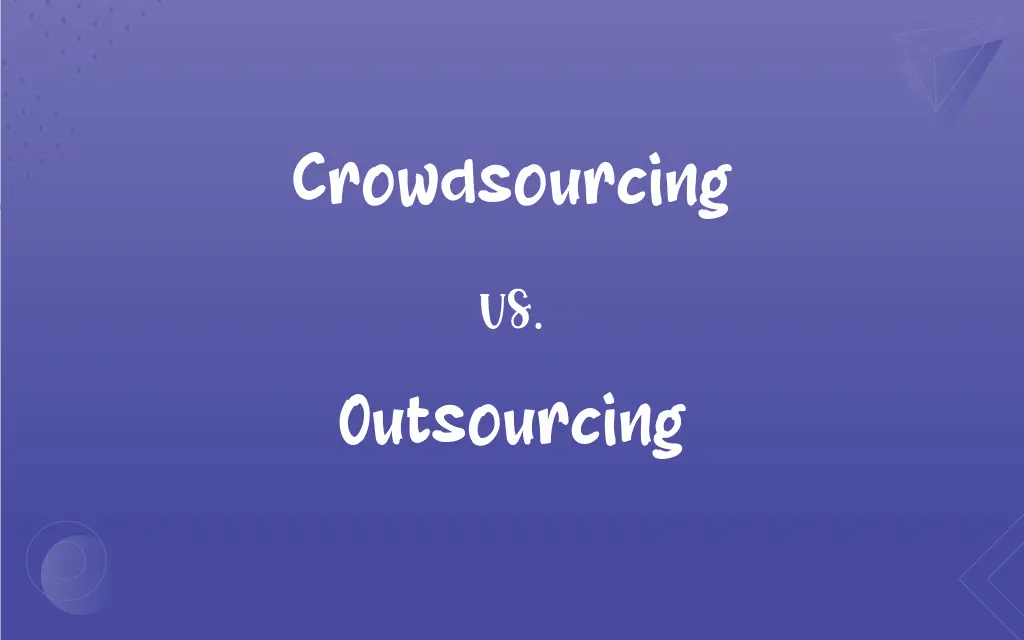Crowdsourcing vs. Outsourcing: What's the Difference?
Edited by Harlon Moss || By Janet White || Published on December 24, 2023
Crowdsourcing involves obtaining services, ideas, or content by soliciting contributions from a large group of people, typically online; outsourcing involves delegating tasks or jobs to external parties.

Key Differences
Crowdsourcing taps into the collective intelligence or skills of a large group, often an undefined public, for tasks like idea generation or problem-solving. Outsourcing, conversely, involves hiring external firms or individuals to perform specific tasks or services, usually for operational efficiency or cost-saving.
In crowdsourcing, contributions come from a vast, diverse, and often voluntary crowd. In outsourcing, a business contracts specific tasks to third-party providers, often professionals or specialized companies.
Crowdsourcing leverages the power of community engagement and collective creativity. Outsourcing focuses on utilizing the expertise and capabilities of external entities to streamline business processes or projects.
Crowdsourcing is often used for tasks like data collection, idea generation, and problem-solving, tapping into a wider array of perspectives. Outsourcing is typically employed for routine, specialized, or labor-intensive tasks, aiming to optimize costs and focus on core business activities.
Crowdsourcing can lead to innovative solutions and community involvement but may lack consistency. Outsourcing offers expertise and efficiency but may reduce internal control over the outsourced functions.
ADVERTISEMENT
Comparison Chart
Definition
Soliciting contributions from a large, often undefined, group of people.
Contracting tasks to external parties or firms.
Objective
Leverage collective intelligence or skills for various tasks.
Delegate tasks for operational efficiency or cost reduction.
Contribution Source
Large and diverse crowd, often public and voluntary.
Specialized external entities or professionals.
Task Types
Idea generation, problem-solving, data collection.
Routine, specialized, or labor-intensive tasks.
Outcome
Innovative solutions, variable consistency.
Expertise and efficiency, potential loss of internal control.
ADVERTISEMENT
Crowdsourcing and Outsourcing Definitions
Crowdsourcing
Using the internet to gather contributions from a wide audience.
They used crowdsourcing to collect data for the environmental project.
Outsourcing
Delegating tasks or services to external companies or individuals.
The firm outsourced its customer service to a specialized agency.
Crowdsourcing
Engaging a large group for ideas or solutions.
The company crowdsourced logo designs through an online contest.
Outsourcing
Using third-party providers for specific business activities.
They outsourced their IT support to focus on core business functions.
Crowdsourcing
Soliciting services, ideas, or content from the general public.
Crowdsourcing helped them gather diverse opinions for the new policy.
Outsourcing
Utilizing external resources for specialized services or labor.
The startup outsourced its marketing to gain expert assistance.
Crowdsourcing
Tapping into collective knowledge or creativity for specific tasks.
The research team crowdsourced their survey to gain varied insights.
Outsourcing
Hiring external parties to perform tasks traditionally done in-house.
Outsourcing manufacturing enabled the company to expand rapidly.
Crowdsourcing
Leveraging a large, often undefined group for problem-solving.
They used crowdsourcing to find innovative solutions for the software glitch.
Outsourcing
Contracting out business processes for operational efficiency.
Outsourcing the accounting department helped reduce costs.
Crowdsourcing
A method of outsourcing work over the internet or similar network by appealing to people to contribute to the project independently or as a collaboration.
Outsourcing
To delegate (a task, function, or responsibility) to an independent provider
"Most retailers outsource the bulk of their manufacturing to Third World countries, where labor is dramatically cheaper" (James Surowiecki).
Crowdsourcing
The delegation of a task to a large diffuse group in order to introduce new or more developed skill sets and improve efficiency. There is usually no substantial monetary compensation involved.
Outsourcing
To relocate or transfer (jobs) to another labor market
"Although the absolute number of jobs outsourced from developed countries to China remains small, the threat that firms could produce offshore helps to keep a lid on wages" (The Economist).
Crowdsourcing
Present participle of crowdsource
Outsourcing
Inflection of outsource
Outsourcing
The transfer of a business function to an external service provider.
FAQs
What is crowdsourcing?
Crowdsourcing is obtaining services, ideas, or content by soliciting contributions from a large group of people, especially from an online community.
Is crowdsourcing cost-effective?
Yes, it often reduces costs by leveraging voluntary or low-cost contributions from a large group of participants.
What are common examples of crowdsourcing?
Examples include Wikipedia for information, Kickstarter for funding, and Waze for traffic data.
Can crowdsourcing improve innovation?
Absolutely, as it brings diverse ideas and perspectives, fostering innovation.
How does crowdsourcing differ from traditional sourcing?
Unlike traditional sourcing from specific suppliers or employees, crowdsourcing taps into the collective intelligence of the public or specific communities.
What industries benefit from crowdsourcing?
Industries like technology, entertainment, consumer goods, and scientific research benefit significantly from crowdsourcing.
What are the risks of crowdsourcing?
Risks include quality control, intellectual property issues, and reliance on an unpredictable workforce.
Is outsourcing only for large companies?
No, businesses of all sizes can benefit from outsourcing various functions.
Is crowdsourcing the same as crowd funding?
No, crowdfunding specifically refers to raising money from the public, while crowdsourcing can involve various types of contributions, including ideas and services.
What are the drawbacks of outsourcing?
Potential drawbacks include loss of control over certain aspects, quality issues, and cultural or communication barriers.
Can outsourcing lead to improved quality?
Yes, if specialized providers with higher expertise or better resources are chosen.
Can small businesses use crowdsourcing?
Yes, it's particularly useful for small businesses seeking resources and ideas without substantial investment.
Why do companies outsource?
Reasons include cost reduction, focusing on core business activities, accessing specialized skills, and increasing efficiency.
What is the difference between outsourcing and offshoring?
Outsourcing refers to delegating work to any outside company, while offshoring specifically means moving work to a company in another country.
What is the future trend in outsourcing?
The trend is moving towards more strategic, partnership-based relationships and an increase in outsourcing complex and knowledge-based tasks.
How is technology impacting crowdsourcing?
Technology, especially the internet, has made it easier to reach large, diverse groups, making crowdsourcing more effective and widespread.
What is outsourcing?
Outsourcing involves hiring third parties to perform services or create goods that were traditionally done in-house.
How does outsourcing affect employment?
It can lead to job displacement in some sectors, but also creates opportunities in outsourcing firms and can lead to more strategic employment in the outsourcing company.
What functions are commonly outsourced?
IT services, customer support, human resources, and manufacturing are commonly outsourced.
How do companies manage outsourced relationships?
Through contracts, regular communications, and quality control measures.
About Author
Written by
Janet WhiteJanet White has been an esteemed writer and blogger for Difference Wiki. Holding a Master's degree in Science and Medical Journalism from the prestigious Boston University, she has consistently demonstrated her expertise and passion for her field. When she's not immersed in her work, Janet relishes her time exercising, delving into a good book, and cherishing moments with friends and family.
Edited by
Harlon MossHarlon is a seasoned quality moderator and accomplished content writer for Difference Wiki. An alumnus of the prestigious University of California, he earned his degree in Computer Science. Leveraging his academic background, Harlon brings a meticulous and informed perspective to his work, ensuring content accuracy and excellence.






































































